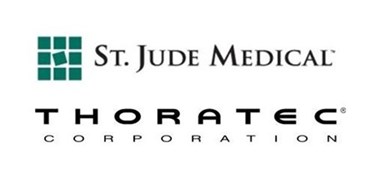St. Jude Pays $3.4B For Thoratec
By Jof Enriquez,
Follow me on Twitter @jofenriq

St. Jude Medical has agreed to acquire Thoratec Corporation, a maker of left ventricular assist devices (LVAD) used for treating end-stage heart failure patients, for $3.4 billion. The deal is expected to close in the fourth quarter of 2015.
“By combining the capabilities and leading technologies of both companies, we will be able to expand access, reduce costs and advance heart failure therapies on a global basis," said D. Keith Grossman, president and CEO of Thoratec, in a joint press release.
St. Jude has been attempting to break into new markets and to acquire smaller companies in order to keep up with consolidating rivals. According to the Wall Street Journal, St. Jude's bid is a bet that Thoratec can maintain its dominance in a quickly developing market. Still, St. Jude's agreement with Thoratec includes a 30-day “go-shop” period, allowing Thoratec to field competing offers, WSJ reported. St. Jude competitors Medtronic and Abbot Laboratories are potential suitors.
Thoratec markets the HeartMate line of LVADs, as well as the CentriMag and PediMag ventricular assist devices. It competes with HeartWare International Inc. in this segment. According to the Star Tribune, Thoratec controls about 60 percent of the $700 million global market for mechanical circulatory support devices.
LVADs traditionally have been used as a "bridge" to heart transplantation — implanted to "buy time" for patients whose heart function is severely weakened and unable to sustain life as they wait for a donor heart to become available. However, LVADs increasingly have become "destination therapy" for many heart failure patients who may or may not be transplant candidates.
“The fact that we are actually competing with heart transplant in terms of outcomes and quality of life is absolutely rewarding,” said Dr. Benjamin Sun, a cardiothoracic surgeon at Abbott Northwestern Hospital and a researcher at the Minneapolis Heart Institute Foundation, to the Star Tribune. “At some point now we are going to hit the inflection point where this technology will actually be better than transplant. I feel very strongly about that.”
LVADs are surgically implanted in the upper abdomen. The device acts as a conduit that pumps blood from the left ventricle and into the aorta and the rest of the body. A cable from the implanted pump connects to an external control unit and battery pack through a small hole in the abdomen.
Last year, Thoratec issued a safety warning related to HeartMate II controllers that resulted in patient deaths. The company now is developing the latest-generation HeartMate III, which commenced a CE Mark trial last year. Bloomberg says a U.S. study is underway and European approval is expected this year.
